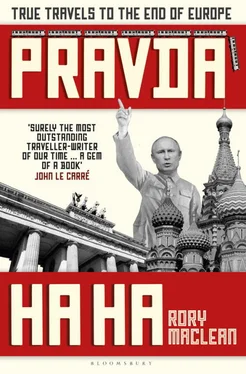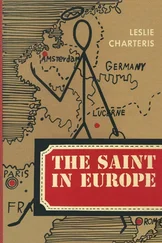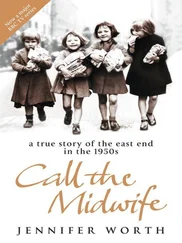Rory MacLean - Pravda Ha Ha - True Travels to the End of Europe
Здесь есть возможность читать онлайн «Rory MacLean - Pravda Ha Ha - True Travels to the End of Europe» весь текст электронной книги совершенно бесплатно (целиком полную версию без сокращений). В некоторых случаях можно слушать аудио, скачать через торрент в формате fb2 и присутствует краткое содержание. Город: London, Год выпуска: 2019, ISBN: 2019, Издательство: Bloomsbury Publishing, Жанр: Путешествия и география, Публицистика, на английском языке. Описание произведения, (предисловие) а так же отзывы посетителей доступны на портале библиотеки ЛибКат.
- Название:Pravda Ha Ha: True Travels to the End of Europe
- Автор:
- Издательство:Bloomsbury Publishing
- Жанр:
- Год:2019
- Город:London
- ISBN:978-1-4088-9652-5
- Рейтинг книги:3 / 5. Голосов: 1
-
Избранное:Добавить в избранное
- Отзывы:
-
Ваша оценка:
- 60
- 1
- 2
- 3
- 4
- 5
Pravda Ha Ha: True Travels to the End of Europe: краткое содержание, описание и аннотация
Предлагаем к чтению аннотацию, описание, краткое содержание или предисловие (зависит от того, что написал сам автор книги «Pravda Ha Ha: True Travels to the End of Europe»). Если вы не нашли необходимую информацию о книге — напишите в комментариях, мы постараемся отыскать её.
Pravda Ha Ha: True Travels to the End of Europe — читать онлайн бесплатно полную книгу (весь текст) целиком
Ниже представлен текст книги, разбитый по страницам. Система сохранения места последней прочитанной страницы, позволяет с удобством читать онлайн бесплатно книгу «Pravda Ha Ha: True Travels to the End of Europe», без необходимости каждый раз заново искать на чём Вы остановились. Поставьте закладку, и сможете в любой момент перейти на страницу, на которой закончили чтение.
Интервал:
Закладка:
I also now had an inkling of what Dmitri meant by ‘one book’.
When the Soviet Union collapsed in the early 1990s, Russians started to starve. In response the European Community donated much of its butter mountain and milk lakes to the rump empire. The Salvation Army, banned during the communist years, opened hundreds of soup kitchens. And George H. W. Bush flooded the place with chicken.
‘Never before had anyone seen such beautiful fat legs, not even on their own babushka,’ recalled Dmitri, making a crude gesture with his manicured hands.
To hungry Russians, the plump pink thighs and drumsticks were manna from Heaven (or at least from Arkansas). With their gift for wit and repartee, they dubbed the phosphate-filled imports ‘Bush legs’.
‘I tell you, my childhood was grey: grey clothes, grey school, grey pot of cabbage soup on cooker,’ recalled Dmitri. His words seemed to be formed at the back of his mouth, stumble across his tongue and then tip syllable by syllable over his lips. ‘When glorious Soviet Union went to dog, people suddenly can buy everything they ever dreamed of, like bananas. To get them they started to hustle, selling salami, vodka, women.’
‘Me, I was nineteen year old. I wanted to be rich. I wanted to escape grey. So I sold chicken. I made office in my uncle apartment. I slept on floor. And no matter how much I sold, no matter how much I charged, people wanted more. More and more Bush legs, which I kept in courtyard in freezer truck. In one month I bought myself cordless telephone. I was so proud. In three months I bought apartment. In one year I had first factory. Now I send my nephew to school at Eton.’
American philanthropy had an ulterior motive, Dmitri explained. Its charity crushed the Russian poultry industry, cornering the market for US farmers, until chancers like Dmitri seized back control. At breathtaking speed – and on borrowed cash – he built his own hatcheries, farms, feed mill and portioning plant. Across Russia hundreds of similar stories could be told of brazen opportunism, criminal acumen and amenable relatives in the KGB. As Dimitri put it, in the 1990s anyone with balls and the right connections could ‘bag couple of oil wells’.
There is a story from those days of two mafia gangs vying to blackmail the same bank. The banker made it known that he’d pay protection money only to the stronger of the two. To prove themselves worthy, the first gang immediately set about kneecapping its opponents. The second gang opted to use brains rather than brawn. It scooped a homeless drunk off the streets, cleaned him up, dressed him in designer clothes and put it about that he was the head of an especially ruthless third gang. He was seen in the best restaurants, spotted buying serious weapons from a KGB fence and overheard boasting about annihilating the competition. Then, with the scene set, and in full sight of the banker, the second gang executed the drunk in cold blood. Some say that he was roasted to death in a burning Mercedes. Others that he was buried up to the neck and decapitated with a scythe. But no matter how the poor man met his end, the ruthlessness of the second gang so impressed the banker that he chose them.
‘Balls and brains,’ Dmitri said, tapping his temple.
Dmitri wasn’t one of the hard boys (and odd girl) who’d moved in such circles. But like them, his life had been propelled from pathetic Soviet grey to inconceivable wealth in a few dramatic months.
‘I wanted all and I took all,’ he boasted. ‘My life was no more grey. My life became history. You write down these words,’ he ordered, gesturing at my notebook. ‘Capitalism is free wolves living among free sheep, for sure.’
Our convoy swept west through Moscow’s so-called sleeping districts. In between the great white apartment blocks and ranked maisonettes, mothers pushed prams around abandoned statues of Lenin. Pensioners sat in the shade of acacia trees. A stray dog lay in a tepid pool of water, struck dumb by the heat. Soon the yawning suburbs gave way to truck lots and karaoke bars, the ugly sprawl leavened by an odd copse of birches and filthy wooden village clinging to life between the carriageways.
Communism’s collapse had led to the redistribution of wealth, but not in a way that anyone could have foreseen. In the early 1990s privatisation vouchers – and then a fraudulent ‘loans-for-shares’ scheme – had divvied up the riches of the Soviet Union. The vouchers gave ordinary Russians a share of state enterprises but few had a clue how to use them. Many changed hands on the street, often for no more than a few dollars or a bottle of vodka. Con artists, entrepreneurs and organised crime syndicates capitalised on public ignorance, amassing millions of vouchers. Boris Yeltsin then sold them control of the country’s largest companies, in return for their support during an election campaign.
‘Some people got bagel, others got bagel hole,’ Dmitri said to explain the rise of the first oligarchs, two dozen of whom came to own 40 per cent of the country.
Then the 2008 financial crisis – the global caesura that would reshape the world – concentrated wealth in even fewer hands, sidelining mid-size operators like Dmitri Denisovich. He had taken out ‘balloon loans’ from both Russian and Western banks, using shares in his own company as collateral to fund its expansion. With the meltdown of the Moscow stock market, and the collapse of his company’s share price, he had to sell his holdings at a crippling loss.
‘I became poor like church rat,’ he insisted with more mock modesty. When I pointed out that the poor tend not to wear Givenchy he snapped in irritation, ‘Real oligarchs own fifty million dollars plus. In book you call me minigarch.’
Along the Rublyovo–Uspenskoye Highway, odd-job men waited by parked cars with Ukrainian licence plates and, further on, underdressed women in high boots and short summer skirts also offered their services. Beyond them traffic policemen idled in the shade, stopping older Ladas, checking papers, asking the driver to breathe on them and pocketing a bribe if they smelt alcohol.
Thirty minutes later the forest began to close in around us, looming so close to the road that it seemed to cut off the light. Family cars pulled onto the gravel shoulder, parents and children with wicker baskets vanishing between the massed conifers. Soon we too turned off the highway and onto a dirt track. I peered ahead in the hope of catching sight of a weathered wooden villa with high balconies and intricate fretwork. I imagined – thanks to Chekhov – long walks in its apple orchard with the scent of hay and the sound of a piano in the air. Instead I saw only deadening pinewoods.
‘Is this the road to your dacha?’ I asked.
‘My dacha?’ replied Dmitri, calm again, playing with the word and me. ‘For sure, you see no dacha at all.’
I recalled my London friend warning me that Dmitri had wildness in him, flooding his veins, beating under his skin, and that I had to be careful. Already ours was a volatile relationship, changing as he asserted himself and I submitted so as to glean his story. On the seat beside him I sensed more than his capriciousness, and pongy aftershave.
‘First we make fun,’ he went on, enjoying his control of the situation, nodding at his bodyguard. ‘Is why we need Vasya.’
Our convoy stopped in the middle of nowhere and five strangers emerged from the other Range Rover. I couldn’t tell who belonged to whom but I guessed the young woman might have been his wife or partner, if he was married. Dmitri made no introductions. No one met my eye.
Vasya – who I’d imagined carried a pistol – opened the lead Range Rover’s tailgate and took out four empty yellow tubs. As he handed them to the group, Dmitri issued instructions in Russian. All responded with a respectful ‘ Sudar ’. The Tsarist ‘Sire’. Vasya then unloaded a coil of rope, black bin bags, a hose… and half a dozen Kalashnikovs.
Читать дальшеИнтервал:
Закладка:
Похожие книги на «Pravda Ha Ha: True Travels to the End of Europe»
Представляем Вашему вниманию похожие книги на «Pravda Ha Ha: True Travels to the End of Europe» списком для выбора. Мы отобрали схожую по названию и смыслу литературу в надежде предоставить читателям больше вариантов отыскать новые, интересные, ещё непрочитанные произведения.
Обсуждение, отзывы о книге «Pravda Ha Ha: True Travels to the End of Europe» и просто собственные мнения читателей. Оставьте ваши комментарии, напишите, что Вы думаете о произведении, его смысле или главных героях. Укажите что конкретно понравилось, а что нет, и почему Вы так считаете.

![Эдвард Докс - Pravda ['Self Help' in the UK]](/books/33503/edvard-doks-pravda-self-help-in-the-uk-thumb.webp)










